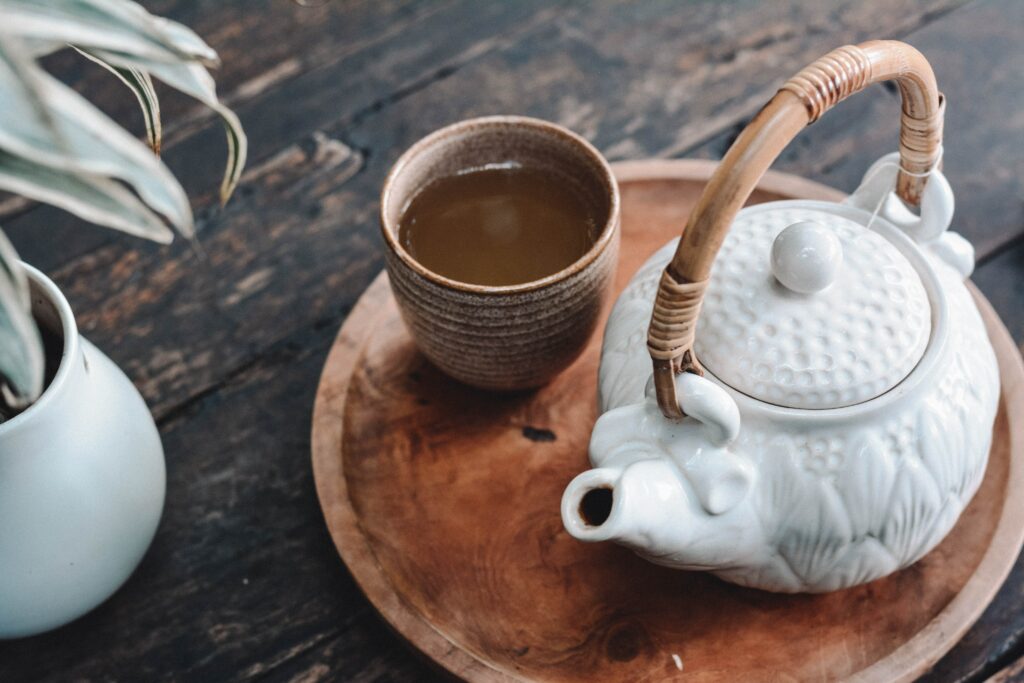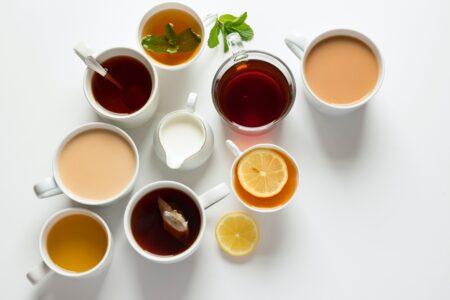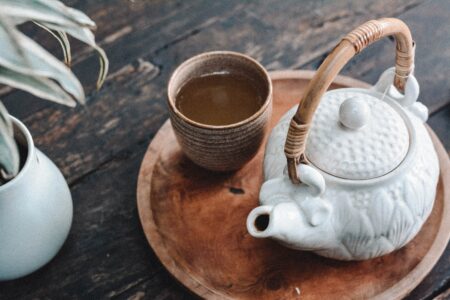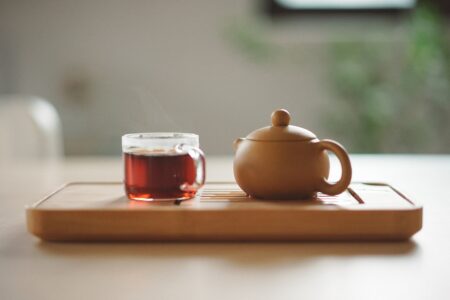Tea Overload: Is Your Daily Cuppa Harming Your Health?

Are you a passionate tea drinker? Do you consume several cups of tea daily and believe it boosts your health when the opposite may be true? While research suggests that drinking moderate amounts of tea can positively benefit physical and mental well-being, too much of the beverage could increase your risk for adverse effects.
In this blog post, we'll explore key considerations to remember if you’re indulging in too many daily cups of tea. We’ll also look at healthier alternatives if needed. So read on—it's time to discover whether that cup of hot bliss is helping or harming you!
The History of Tea and Its Popularity
The Origin Story of Tea
Tea is believed to have originated in China, where it was consumed as far back as 2737 BC. It wasn’t until the 16th century that tea came to Europe when Portuguese traders brought it back from their travels in China. However, it wasn’t until the 17th century that tea became more popular in Britain. This was thanks mainly to Catherine of Braganza, the queen consort of England's King Charles II, who introduced tea drinking at court during her reign. From then on, tea became increasingly popular among British citizens, and by 1750, it had become Britain’s favourite drink and a regular part of everyday life for many citizens.
The Emergence of Afternoon Tea
By 1820, afternoon tea had become an established ritual in Britain. The practice was initially started by Anna Maria Stanhope (the Duchess of Bedford), who would often feel hungry around four o'clock in the afternoon before dinner time. She started asking for light snacks and small sandwiches to be served with her cup of tea at five o'clock to tide her over until supper time. Her friends soon followed suit, and this custom quickly caught on with other members of high society. Eventually, afternoon teas became so popular that even working-class households began having them during holidays or special occasions such as birthdays or weddings.
https://unsplash.com/photos/RKDP3D-6G5E
alt text: a white ceramic mug with tea inside
The Modern-Day Appeal of Tea
Today, there are few drinks more ingrained into British culture than tea –– whether enjoyed with breakfast or after dinner with dessert. Whether you prefer black or green teas, herbal teas, or flavoured teas –– like Earl Grey –– there is a taste that suits any palette in the modern supermarket. Tea gives the modern human a moment to think, to enjoy, and to be.
Overview of the Types of Tea
With its origins dating back thousands of years, tea has come to encompass a variety of unique flavours and types. From herbal teas to yellow tea, there’s an abundance of options for all drinkers. Most types should be brewed and served at different temperatures, according to the leaves used in the tea. Here’s a breakdown of the main types of tea and their brewing temperatures:
- Black tea: 95–100°C
- Green tea: 70–80°C
- White tea: 65–85°C
- Oolong tea: 80–90°C
How Much Tea is ‘Too Much’?
Tea is a popular beverage cultivated and enjoyed for centuries, and many cultures worldwide enjoy their unique tea-drinking customs. Although there are many benefits to adding tea to our daily diets and lifestyles, health experts generally agree that we should stick to no more than 4 cups per day.
What Happens When You Drink Too Much Tea?
Drinking too much tea can have various negative effects on your health. The high levels of caffeine present in some teas can cause palpitations, nervousness, insomnia and irritability. In addition, overconsumption of tea can interfere with the absorption of essential vitamins and minerals such as iron and calcium because some constituents found in tea may decrease their bioavailability. People that drink vast amounts of tea regularly may suffer from dehydration due to its diuretic effect.
Furthermore, people sensitive to caffeine should be extra cautious when drinking tea as they may experience elevated heart rate, anxiety and tremors. It is important to remember that although evidence suggests an association between green tea consumption and lowered risk of certain types of diseases, regular overconsumption of highly caffeinated teas should be avoided.
Caffeine Content in Different Teas
Tea is a trendy beverage, and it comes in wide varieties with unique flavours and health benefits. You may be surprised to know that all types of tea contain some levels of caffeine; however, the amounts vary depending on the type of tea. Comparatively, many types of teas have a moderate level of caffeine when compared to coffee.
Here's a rough breakdown of caffeine content by tea type:
- Black tea: 40–60mg of caffeine per cup
- Green tea: 25–40mg of caffeine per cup
- Oolong tea: 12–55mg of caffeine per cup
- White tea: 6–60mg of caffeine per cup
- Herbal teas (including lemon balm, chamomile and hibiscus): 0–5mg of caffeine per cup
Regardless of what type you prefer, tea is a great way to stay hydrated and enjoy the rich flavours and nutritional benefits it has to offer. As with any beverage or food, moderation is key for healthy consumption.
Tea and Its Impact on Hydration
Tea is often enjoyable but can positively affect our health and hydration. Tea is an excellent source of antioxidants that can improve our cardiovascular health, reduce stress, and energise us. But tea does more than taste good; a normal amount (i.e. 2-3 cups a day) of tea can help prevent dehydration.
Caffeine has a mild diuretic effect, encouraging urination so that your body will replace fluids that otherwise would be lost due to activity or simply being outdoors where it may be hot and dry. Drinking other caffeinated beverages such as soda or coffee won't provide the same hydration replacement benefits since their sugar content acts to pull moisture from your body.
Does Tea Have Any Nutritional Value?
Tea, in general, is known for its calming and soothing properties. However, some types of tea are beneficial to our health as well. Herbal teas, made from steeping herbs, plants and spices in hot water, offer nutritional value that can help support overall wellness.
Whether it’s a herbal blend to ease insomnia or a green tea to boost our metabolism and immune system, these drinks provide antioxidants and vitamins that can contribute to our nutrition. Not only are herbal teas delicious, but they can also fill our bodies with essential minerals such as zinc, iron, magnesium and phosphorus. Drinking herbal tea is a great way to add nutrients to our diet without taking pills or supplements.
The Link Between Tea Consumption and Heart Health
Regular consumption of tea has been linked to lower blood pressure levels, reducing the risk for heart disease. Studies have shown that drinking 3-4 cups of green tea a day can help reduce the risk of stroke as well. Additionally, Polyphenols and catechins found in green and black teas are thought to improve cholesterol levels in both men and women, leading to improved heart health.
Some types of tea are also thought to reduce the risk of certain cancers due to their high antioxidant content. Although there is much more research needed before any definitive conclusions can be made, current evidence suggests that tea consumption may be beneficial in protecting our health.
Tea and Its Potential Role in Cancer Prevention
Tea is rich in antioxidants, natural compounds that can help fight off free radicals, which are molecules that damage cells and contribute to the development of cancer. Free radicals are produced by everyday activities such as smoking, exposure to UV light from the sun, and even simply breathing. Regularly consuming foods and beverages that contain antioxidants can help offset any negative effects caused by these activities.
Green tea is exceptionally high in antioxidants thanks to its production process, which involves steaming the leaves instead of fermenting them like other teas (such as black or oolong). This process helps preserve many beneficial compounds in green tea leaves, making it a great choice for anyone looking for an antioxidant boost.
While numerous studies have been conducted on the potential role of tea in cancer prevention, most experts agree that more research must be done before any definitive conclusions can be made. However, some studies have shown promising results about certain types of cancers.
The Effect of Tea on Sleep
Tea is a popular beverage for many, especially in the afternoon. But did you know that it can also affect your sleep quality? Studies suggest drinking tea too close to bedtime may disrupt your body's sleep cycle. The presence of caffeine in tea not only keeps one from getting drowsy but limits the production of melatonin, a hormone associated with inducing sleep.
Moreover, it suppresses rapid eye movement (REM) sleep, adversely affecting overall health and well-being. Despite the potential negatives, tea does provide some benefits for better-quality sleep. Certain teas, like black and chamomile tea, are packed with antioxidant elements and have social benefits if consumed moderately during dinner or an hour before sleeping. This will help you relax as it promotes normal bodily functions while limiting caffeine intake so you can still fall asleep easily at night with minimal disruptions.
The Impact of Tea on Anxiety and Stress
Studies have shown that regular tea drinking can help reduce stress and anxiety. The calming effects of tea are largely due to its active ingredients, such as l-theanine, which has been found to increase alpha wave activity in the brain, resulting in relaxation. Tea also has low levels of caffeine, which, unlike coffee, does not cause overstimulation and can provide a more relaxed energy boost compared to other beverages.
Furthermore, like many activities involving intentionality and thoughtfulness, drinking tea can be an act of self-care. Taking the time to steep a cup of tea and savour its flavour can bring peace in moments of distress or calm down any rising feelings of anxiousness. All these benefits make it no surprise why tea is one of the oldest drinks known to man, with its calming effects still strong today.
Tea Consumption During Pregnancy
Drinking moderate amounts of tea during pregnancy is an enjoyable way for expectant mothers to get their daily caffeine fix. But does this mean it's safe to drink tea during your pregnancy? While there are no clear-cut guidelines around drinking tea during pregnancy, studies have suggested that moderate consumption of herbal and green teas can offer various benefits. Considering the antioxidant activity in green and herbal teas and their natural diuretic effects, they provide medicinal value, making them ideal beverages while pregnant.
Despite small amounts being generally safe, health experts recommend pregnant women don't consume more than 300mg of caffeine a day. Women sensitive to caffeine may want to limit their caffeine intake to 100mg per day.
Alternatives to Tea for Improved Health
With social media 'experts' often touting the many benefits of tea, many of us increasingly feel the need to drink different teas for improved health. While tea remains popular for its wide variety of flavours and health benefits, plenty of other alternatives are available. Alternatives range from herbal infusions like tulsi and rooibos to exotic blends like yerba mate and kombucha.
Each of these drinks has its distinct flavour and offers a range of health benefits that can help support overall well-being. With so many different teas available, it cannot be easy to know which one is right for you, but by learning about their unique benefits and properties, you can find a tea that suits your taste buds while also helping you stay healthy.
Conclusion: Is Tea Consumption Harmful or Beneficial?
In conclusion, drinking tea can be both beneficial and harmful. Moderate herbal or green tea consumption is considered safe during pregnancy and can offer various health benefits. However, it’s important to remember that consuming too much caffeine from any source may adversely affect some people.
Our boiling water taps can make up to 50 cups of tea an hour, perfect for the tea-loving British family. Find out more about how a boiling water tap works.



